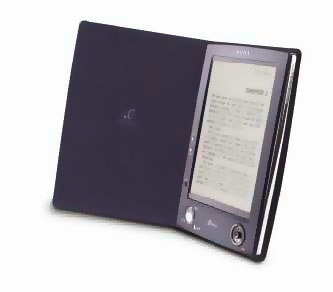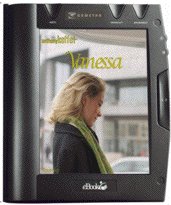Another Important eBook Announcement


"July 16, 2003
We are writing to report to you on two developments regarding eBook operations. First, as reported in our June 18, 2003 announcement, the Gemstar eBookstore is now closed and we have stopped selling devices, books and periodicals.
GEB 2150 Specifications
Weight - 33 ounces
Size - 7.5" x 9" x 1.25"
Memory - Comes with 8MB, upgradeable with CompactFlash™ Memory Cards
Battery - Rechargeable Lithium-Ion battery lasts up to 10 hours of continuous use
Screen - Back-lit 8.2" diagonal color LCD touch screen
Communications - Internal v.90, 56Kbps modem and Ethernet"
The price was $299.
Now we have Sony's new ebook device.
"Since it lost out to Apple in the lucrative business of digital music, Sony has sought an edge over its rival in electronic books. The outfit's new Reader is the size and weight (and has the feel) of a slim hardcover. But it can pack about 80 books at a time and display 7,500 pages before needing a battery recharge.
The device will run eBooks sold on Sony Connect online store, as well as PDF files, Web pages and MP3s. But don't expect to see the Reader everywhere overnight. It's available only in select stores. Sony will only rely on word-of-mouth marketing at the outset."
Price? $400.
Has anything changed between the introduction of the Rocket reader (which became the Gemstar shown above left) and Sony's new reader (shown above right)?
Wade Roush, who worked for NuvoMedia, the company behind the Rocket and then Gemstar, is skeptical.
"In my opinion, the technology didn't tank because the devices didn't simulate real books well enough; it tanked because of Yuen's mismanagement and because leading New York book publishers weren't ready to release their content electronically at realistic prices. (Wary of cannibalizing sales of their print books, most publishers charged the full hardcover price for their electronic editions.)
Indeed, if an authentic book-reading experience is what consumers are looking for, the new Sony e-reader -- which BW's sources said is based on an earlier device marketed in Japan called the Librie -- won't have a much better shot at success than the previous generation of e-book devices. While the Librie is based on an innovative 'electronic paper' technology from E Ink, it is cut from the same mold as the Rocket E-Book, with a flat, inflexible, monochrome screen, operated by push-buttons."
The Business Week article reads exactly like so many pieces of ebook boosterism that I recall reading in the late 90s when the Rocket and other dedicated readers were introduced.
"Every other form of media has gone digital -- music, newspapers, movies," says Joni Evans, a top literary agent who just left the William Morris Agency to start her own company that will focus on books and technology. "We're the only industry that hasn't lived up to the pace of technology. A revolution is around the corner."
There are advantages to digitizing music and movies, less so with newspapers. And even less so with books. What advantage does digitizing books give to the average reader? I think that magazines would be the perfect medium to benefit from a transition from paper to digital.
I suppose I should be an enthusiast of ebooks. My first computer, an Epson PX-8 Geneva, was a laptop with a reflective screen that only displayed eight lines of text at a time. I loved it and was still using it when I moved up to an Apple PowerBook 165. I wish I had ten dollars for every review of laptops in the 80s that complained about headaches and readability problems with the LCD screens available then.
I never had those problems. Screen quality has not been an impediment to my acceptance of ebooks. Still, I've never become a convert to ebooks. Maybe it's just conditioning. I have an extensive library of paperback and hardcover books that I've acquired over thirty plus years. Some of them have become collectible. Many of them carry powerful associations of the time, place and person I was when I bought them. Books are literary fetish objects for me.
Perhaps young readers accustomed from an early age to seeing everything through the mediating technology of one type of display screen or another who have yet to amass more than a few paper books will readily adopt ebooks.

